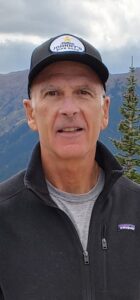For our January hike, we will be exploring the western side of the Norwalk River. The trail begins just beside the Red Rooster restaurant off Route 7. More details to come as we approach the date in the New Year.
Trailmaster Alec Wiggin
For our January hike, we will be exploring the western side of the Norwalk River. The trail begins just beside the Red Rooster restaurant off Route 7. More details to come as we approach the date in the New Year.
Trailmaster Alec Wiggin
 Peter Smith graduated from the University of Notre Dame in 1978 and Rutgers Law School in 1981. He has been a partner at Connell Foley LLP for more than 36 years. He assists clients with the litigation and arbitration of construction disputes in New Jersey and New York. His deep understanding of complex construction issues and applicable legislation has been honed by his experience providing counsel in regard to a broad range of public and private construction projects.
Peter Smith graduated from the University of Notre Dame in 1978 and Rutgers Law School in 1981. He has been a partner at Connell Foley LLP for more than 36 years. He assists clients with the litigation and arbitration of construction disputes in New Jersey and New York. His deep understanding of complex construction issues and applicable legislation has been honed by his experience providing counsel in regard to a broad range of public and private construction projects.
Peter has served on a variety of construction industry arbitration panels, deciding claims involving major commercial, public and quasi-public construction projects and surety matters. He has been Certified by the Supreme Court of New Jersey as Civil Trial Attorney.
Peter moved to Darien in August, 2024 from Mendham, New Jersey, where he raised his family. His wife passed in 2020. His two married daughters and grandchildren live on the upper west side of Manhattan. He enjoys live music, theater, cycling, hiking and travel.
 The Restless Wave by Adm. James Stavridis pp.400
The Restless Wave by Adm. James Stavridis pp.400
From the New York Times bestselling former NATO commander comes a riveting historical novel that charts the coming-of-age of a gifted but immature young naval officer as he is tested in the crucible of World War II in the Pacific
Scott Bradley James arrives in Annapolis, Maryland, as a plebe in the class of 1941 without a terribly good idea why he wants to be a naval officer, other than that his father was a sailor, and he wants to see the world, whatever that means. Scott and his roommate become fast friends, and, after surviving scrapes of their own making, the two fetch up at Pearl Harbor. War is brewing, and their class has graduated early. They have been sent to battle stations.
Admiral James Stavridis is an acclaimed novelist, a decorated military leader, and a great student of military history. He draws on it all to capture the experience of being storm-tossed by the bloody first years of the Second World War. Scott Bradley James is a talented young officer, but he has a lot to learn. And war will have a lot to teach him.
The Restless Wave offers a gripping account of the U.S. Navy’s astonishing progress through the first three years of the war in the Pacific, from Pearl Harbor through to Midway, Guadalcanal, and the Coral Sea. A story of character under pressure in the harshest of proving grounds, it is written with careful fidelity to the truths of war that have made sea stories essential to the art of storytelling since Odysseus. (Goodreads)
 Sir Ahmed Salman Rushdie ( ; born 19 June 1947) is an Indian-born British-American novelist. His work often combines magic realism with historical fiction and primarily deals with connections, disruptions, and migrations between Eastern and Western civilizations, typically set on the Indian subcontinent. Rushdie’s second novel, ”Midnight’s Children” (1981), won the Booker Prize in 1981 and was deemed to be “the best novel of all winners” on two occasions, marking the 25th and the 40th anniversary of the prize.
Sir Ahmed Salman Rushdie ( ; born 19 June 1947) is an Indian-born British-American novelist. His work often combines magic realism with historical fiction and primarily deals with connections, disruptions, and migrations between Eastern and Western civilizations, typically set on the Indian subcontinent. Rushdie’s second novel, ”Midnight’s Children” (1981), won the Booker Prize in 1981 and was deemed to be “the best novel of all winners” on two occasions, marking the 25th and the 40th anniversary of the prize.
After his fourth novel, ”The Satanic Verses” (1988), Rushdie became the subject of several assassination attempts and death threats, including a ”fatwa” calling for his death issued by Ruhollah Khomeini, the supreme leader of Iran. In total, 20 countries banned the book. Numerous killings and bombings have been carried out by extremists who cite the book as motivation, sparking a debate about censorship and religiously motivated violence. In 2022, Rushdie survived a stabbing at the Chautauqua Institution in Chautauqua, New York.
In 1983, Rushdie was elected a fellow of the Royal Society of Literature. He was appointed a of France in 1999. Rushdie was knighted in 2007 for his services to literature. In 2008, ”The Times” ranked him 13th on its list of the 50 greatest British writers since 1945. Since 2000, Rushdie has lived in the United States. He was named Distinguished Writer in Residence at the Arthur L. Carter Journalism Institute of New York University in 2015. Earlier, he taught at Emory University. He was elected to the American Academy of Arts and Letters. In 2012, he published ”Joseph Anton: A Memoir”, an account of his life in the wake of the events following ”The Satanic Verses”. Rushdie was named one of the 100 most influential people in the world by ”Time” magazine in April 2023.
Rushdie’s personal life, including his five marriages and four divorces, has attracted notable media attention and controversies, particularly during his marriage to actress Padma Lakshmi.
The next planned activity is the Holiday Party. This will be held on Wednesday, December 18 at the Country Club of Darien starting at 5:30 p.m. We will be welcomed with a pianist playing Christmas music during the cocktail hour with more Christmas music after dinner provided by the Camerata Singers, which is a wonderful extra-curricular ensemble of 7th and 8th graders from Middlesex Middle School.
Anyone who would like to join the committee or contribute to an event should contact Doug Bora.
Thursday, November 14, 2024, at 8:36 a.m.
The next visit to New York will actually be to New Jersey! We will take the train from Darien at 8:36 a.m. (or 3 minutes later from Noroton Heights) to Grand Central, and then via the shuttle and bus across to Weehawken. Under the guidance of Sunil Saksena, we will go to Hoboken and visit sites along the Hudson River, including the Erie Lackawanna railroad depot and Stevens Institute of Technology in Hoboken.
Please direct any questions to David Mace or Joe Spain. Contact them at davidmace@optonline.net or jhspain@sbcglobal.net.
© 2025 Darien Mens Association
Theme by Anders Noren — Up ↑